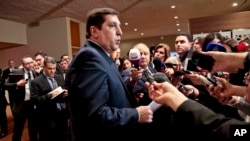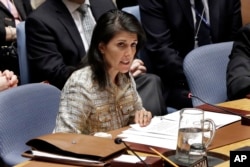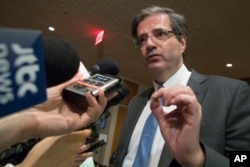Russia says it will veto a draft U.N. resolution blaming the Syrian government for some chemical weapons attacks in Syria if it is brought to a vote.
"The resolution prejudges the results of the investigation, it is one-sided [and] based on insufficient evidence," Russian Deputy U.N. Envoy Vladimir Safronkov told reporters after a closed meeting of the council to discuss the issue.
The Security Council created a special OPCW-U.N. (The Organization for the Prohibition of Chemical Weapons) Joint Investigative Mechanism — known as JIM — in August 2015 to study several chemical weapons attacks that took place in Syria since 2011 and identify "to the greatest extent feasible" individuals, entities, groups, or governments who were perpetrators, organizers, sponsors or otherwise involved in the use of chemicals as weapons in Syria.
Three chemical attacks confirmed
In October, the joint investigation concluded that the Syrian military had carried out at least three chemical attacks in 2014 and 2015.
"There is tremendous pressure over JIM to get to sort of one-sided results of investigation," Safronkov said. "When we created JIM we said that investigation should be impartial, objective, independent — it's not the case right now because of that pressure."
Russia has deployed six vetoes in the past six years to protect Syrian President Bashar al-Assad from Security Council action.
Haley frustrated with Russia
"It is ridiculous. How much longer is Russia going to continue to babysit and make excuses for the Syrian regime?" U.S. Ambassador Nikki Haley asked. "People died because of this and the United States isn't going to be quiet about it."
Britain, France and the United States have been working for months on a draft security council resolution that would sanction the Syrian regime for its use of chemical weapons and say they plan to bring it to a vote in coming days.
Delattre says evidence is clear
"We now have the clear evidence that chemical weapons have been used in Syria against civilian populations, and we also have converging indications that such weapons continue to be used in this country," France's envoy Francois Delattre told reporters. "If you think about it, on a scale of threats to peace and security, we are at 10 here."
"You had an overwhelming vote to say we need an investigative mechanism that would prove that these chemical weapons were being done by the Syrian regime, now ... the results have come out and people don't like what the results are," Haley said in reference to Russian objections.






